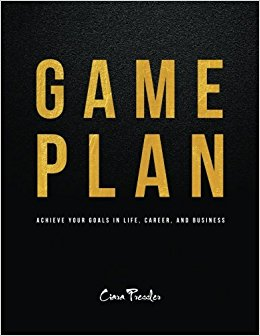Fractured Atlas Book Club: Game Plan
If you’re looking for an older sister to help guide you along and offer both practical counsel and bottomless encouragement, Ciara Pressler has got your back. Game Plan is a workbook to help you think through and define your personal, career, and project goals. Pressler works with artists, creatives, and other innovators collaboratively to develop strategic plans to achieve their missions, and founded the Pressler Collaborative, a marketing collective devoted to that work. In that vein, this is not a book offering advice or “how-to” information. This book won’t tell you what your game plan should be, but rather how to go about crafting one, giving you blank space on the page to jot all your ideas and dreams down, and refine an actionable plan to meet those goals.

Which is not to say that Pressler doesn’t help shepherd you along the way. She starts off by laying out a set of twenty-four “goal principles.” These strategies contain grains of evergreen wisdom, peppered with real-world commentary and personal anecdotes from her own life and her experience as a consultant. Her strategies are written broadly, so they can apply to pretty much any situation, whether you’re trying to pay off your student debt from art school, launch your own production company, or finish your Great American Novel. I’ve picked out a few choice strategies here which I think are particularly applicable to the work of Fractured Atlas members:
Measurable: “If you can’t track it, you won’t hack it.”
- In my work at Fractured Atlas, people often ask me: “how often do fiscally sponsored projects meet their fundraising goals?” The short answer: it depends. If you want to raise enough money to put on your show, what does that mean for you? How much money will you need and when? A fundraising goal isn’t just a number with dollar signs in front of it — it’s also a plan with a timeline. If you need to put down on a deposit for your theatre space in June, you’ll submit your Fundraising by Fractured Atlas campaign for review in time so that you can launch and finish your crowdfunding campaign well in advance of that date. And if you plan really well you’ll plan to give yourself time to re-tool and cut down to skinnier production costs. Or if you’re really persistent, you can give yourself time to pursue other revenue streams. Because the show must go on.
Endurance: “Run your race at your pace.”
- So you’ve drafted your budget and you need to raise $100,000. You were only just approved for fiscal sponsorship with Fractured Atlas, and your project’s fund balance is haunting you: $0. Here’s the thing: any and all organizations start from $0. With larger fundraising goals, you’ll always need smaller sub-goals. It’s less about how you’re ever going to raise $100,000, and more how are you going to raise your first $1,000, and then your next $1,000, and so on. There’s a reason why people say every little bit helps.
Action: “Avoid paralysis from over-analysis.”
- So you’ve got an ambitious fundraising goal, and the panic has set in. For those of us who tend to ruminate, we can spend a long time researching and speculating about the best approach, and never moving forward. Asking people for money is intimidating. But you won’t raise even $5 if you’re stuck trying to figure out how to write the most perfect appeal letter ever. Careful planning can be truly helpful. But the plan is not your goal, the plan is only a means to meet your goal: raising money so you can do your work. Don’t waste your time editing your email pitch for the twentieth time when you could be spending that time sharing your project and getting the word out to your donors and community.
While my examples here apply to fundraising, any of these principles could apply to not just the business side of your work, but your creative practice as well. For instance, if you’re really going to write that novel, you’ll have to write your first chapter, and that chapter will start with your first sentence. Making it happen is likely going to be a far less painful process if you’ve got a good game plan.
And you know what? You might decide after you’ve written your first 100 pages that your protagonist annoys the crap out of you and you’d rather be painting than writing. That’s the best thing about an older sister: she won’t judge you if your goals change over time — she just wants you to be happy and fulfilled by the work that actually sustains and excites you. Perhaps the most refreshing and direct guidance Pressler offers is the encouragement that you should pursue the goals which you actually feel passionate about today — not what was important to you when you chose your major in college or what you said you would do in your meticulously crafted five-year plan. Because again, your game plan should always be about getting where you actually want to go.
If you’d like to check out Game Plan for yourself, you can download an excerpt or purchase via Pressler’s website here.
About Arno Mokros
Arno Mokros is a queer writer, print artist, and administrative professional committed to fostering accessibility and inclusion in arts communities. He is co-founding editor of Little Pharma, an intersectional feminist art and literary zine, a dedicated space for creative explorations of mental illness. Prior to joining the Fractured Atlas team, he gained program administration experience at the Social Science Research Council in Brooklyn, NY. He holds a B.A. from Smith College, and completed coursework at the University of Hamburg in Hamburg, Germany.


